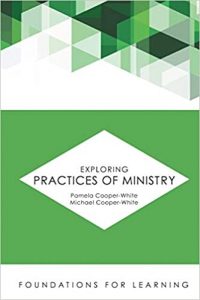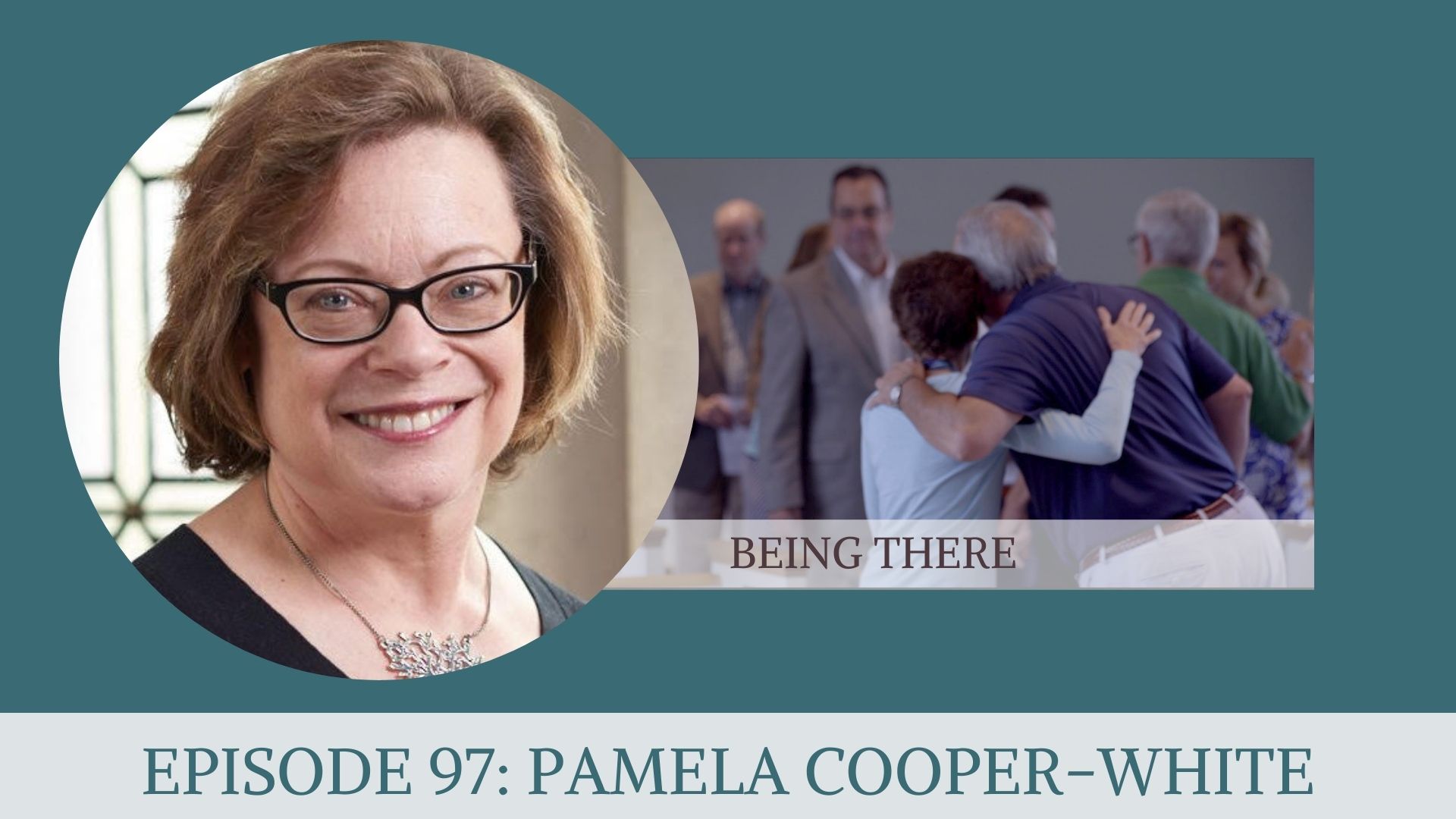This week I am so excited to welcome my friend and colleague in pastoral theology from Union Theological Seminary, Rev. Dr. Pamela Cooper-White as our featured author! In this episode Dr. Cooper-White, Vice-President of Academic Affairs and Dean, and the Christiane Brooks Johnson Professor of Psychology & Religion, shares her thoughts on her latest book. We also offer to you, one of her recent presentations on the newest developments in pastoral and spiritual care.

This Spring semester, which began last week, Pam and I have the joy of teaching courses that work in tandem. I’m teaching the introduction to pastoral and spiritual care and she teaches the listening practicum. In Exploring Practices of Ministry, a book coauthored by Pam and Michael Cooper-White, she offers this word of wisdom about being there for people:
“The caregiver needs to experience patience, non-intrusiveness (not being pushy or having an agenda for the parishioner to follow), and devotion to nonjudgmental listening” (74).
When I teach students in the intro course I assume that everyone is a beginner or novice. Of course there are exceptions. And some people come to seminary with much training in a helping profession, like nursing, or ministry or medical care, or chaplaincy. They are more than competent at listening already. Whatever their experience, I encourage all students to set learning goals for themselves for whatever stage they are in. And also I want them to think aspirationally about learning in practice, to challenge and stretch themselves.
Being There
For most beginners, learning the lessons of being there for the people we lead requires some experience. I remember an especially glaring beginner’s mistake that I made in NOT being there for a family in crisis at my first call in a local congregation. You see, I knew in my head the importance of being there, but I missed a call meant for me. I had to learn a hard lesson about showing up and being there for people in crisis and grief. When I thought they were asking for someone besides me — the senior pastor, the “real minister” — I had to work quickly to overcome my missteps.
In this episode of 3MMM, Pastor Grace tells us about learning through trial and error the great importance of being there for people at their time of crisis and need. After years of missing this significant aspect of being a pastor, It only took getting it right once to help her see why it mattered so much.
More on “Being There” | video | blog | podcast
Learning in Practice with Pamela Cooper-White
 We interviewed Dr. Cooper-White about her work as a professor, Episcopal priest, and pastoral theologian. As a leading figure in the field of pastoral theology, she has written numerous books, articles and essays about both psychology of religion and practical theology.
We interviewed Dr. Cooper-White about her work as a professor, Episcopal priest, and pastoral theologian. As a leading figure in the field of pastoral theology, she has written numerous books, articles and essays about both psychology of religion and practical theology.
Earlier in February, she gave a lecture for the International Association for Spiritual Care. In that lecture (start at 07:16) she provided a wonderful overview of the ways that the field of pastoral and spiritual care has changed in recent decades. Having that big picture of the shifts in the profession of pastoral theology helps newcomers. And they can see how they fit into what is happening in the broader world. In this video her presentation is the first. And the other two presentations by Dr. Emmanuel Lartey and Rev. Kei Okada are well worth your time also.
Your book Gender, Violence and Justice offers so much to ministers and leaders. What do you hope this book will do for its readers?
PCW: The book is a collection of four decades of essays. My hope is that by having them all in one place (rather than scattered throughout multiple journals and anthologies), they offer a body of work in pastoral theology and advocacy that can inform and strengthen our pastoral responses to victims and survivors of gender-based violence.
At a time when legislative and governmental support for battered women and victims of sexual assault has been waning, it is important for religious leaders to continue to hold together our pastoral and prophetic commitments on behalf of victims and survivors, both in our practices of care and our public advocacy.
The introduction, and foreword by Sally MacNichol, of Gender, Violence and Justice bring the essays together with new insights from recent research. The book also incorporates perspectives of contemporary advocates who are working to support victims of violence.
What questions do you live by?
PCW: What can I do today, as I listen for guidance from the Spirit and from my community, to make a contribution to the healing and empowering of suffering beings?
We also want to recommend questions for reflection from Dr. Cooper-White’s pastoral care chapter in Exploring Practices of Ministry:
- What obstacles or distractions might get in the way of your being a helpful listener?
- Thinking back on a time when you were hurting or grieving what did you need from others? What did they do that was helpful and not so helpful?
- What changes are adaptations to your own practices might you make in order to provide culturally appropriate care? (p. 92)
This #pandemic year is demanding for every pastoral care giver! This week pastoral theologian Dr. Pamela Cooper-White of @UnionSeminary is our guest on #3MMM
She asks helpful reflection questions in her pastoral care chapter in "Exploring Practices of Ministry" @Fortresspress pic.twitter.com/d4U2dYoo4L
— Three Minute Ministry Mentor (@3MinuteMin) February 8, 2021
What questions do you wrestle with in your practice of ministry?
PCW: How to gently and respectfully help people whose theology I view as self-destructive or self-punitive allow themselves to find a relationship with a loving, forgiving God, while not trying to take away the solid foundation of faith on which they currently depend. For example, someone who believes God caused their cancer as punishment; someone who believes they should stay in an abusive relationship because God wants them to stay true to their marriage vows – even though the marriage has already been broken by the abuser’s violence.
How has your practice of ministry changed over time?
PCW: Although there is an red thread of activist-justice work running through all the commitments I have made in various places of ministry and in my writings, I hope I have become more contemplative, more able to listen with compassion to those with opposing views, more committed to discerning complexity in people’s beliefs and identities.
My psychoanalytic training has become a crucial and “complexifying” thought partner for me with my living out of my faith as an Episcopal priest and seminary professor. It’s a journey – never done! I have only half-jokingly told my family my epitaph should be: “First she was zealous, then she was kind.”
What is on your must-read list right now?
PCW: Wendy Farley, Beguiled by Beauty: Cultivating a Life of Contemplation and Compassion (Westminster John Knox Press, 2020)
For an opportunity to win one of Dr. Cooper-White’s books (kindle), just make sure you are subscribed to Three Minute Ministry Mentor by the end of February.
++++++++++++
 “Being There” is a featured chapter in Eileen’s forthcoming book, Pastoral Imagination: Bringing the Practice of Ministry to Life . Pre-orders are open now!
“Being There” is a featured chapter in Eileen’s forthcoming book, Pastoral Imagination: Bringing the Practice of Ministry to Life . Pre-orders are open now!
Friends, we hope you will watch for a special opportunity to get both the new book and a companion journal. Announcement coming soon! Stay with us!
Remember we are here to accompany you as you cultivate your pastoral imagination and your practice of ministry. We want to support you while you are working to be present for your people!




